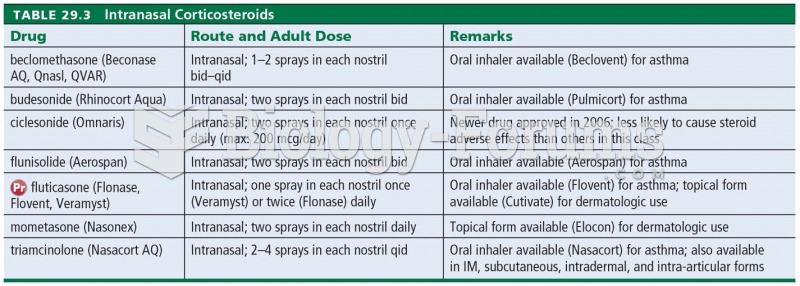Answer to Question 1
Correct Answer: 2
Rationale 1: Intranasal steroids do not cause neck stiffness.
Rationale 2: Intranasal steroids typically are well tolerated. The client might experience burning at the time of application, as well as nosebleed and headache.
Rationale 3: Intranasal steroids do not cause muscle aches or conjunctivitis.
Rationale 4: Intranasal steroids do not cause sneezing; they relieve it. They do not trigger hiccups either.
Global Rationale: Intranasal corticosteroids such as beclomethasone may cause transient nasal irritation along with burning, sneezing, and dryness. Nasal ulceration may lead to nosebleed. The remaining symptoms are not adverse effects of beclomethasone.
Answer to Question 2
Correct Answer: 1
Rationale 1: Intranasal decongestants that are used repeatedly may cause rebound congestion. They should not be used for more than 5 consecutive days.
Rationale 2: Intranasal steroids relieve inflammation; they do not address congestion.
Rationale 3: Oral decongestants do not trigger rebound congestion.
Rationale 4: Oral antihistamines address irritation, drainage, and sneezing. They do have a decongestant effect.
Global Rationale: The most serious, limiting adverse effect of the intranasal decongestants is rebound congestion. In almost all patients, prolonged use causes hypersecretion of mucus and worsening nasal congestion once the drug effects wear off. This leads to a cycle of increased drug use as the condition worsens to obtain the desired effect from these drugs. Because of this rebound congestion, intranasal sympathomimetics should be used for no longer than 3 to 5 days. Intranasal steroids, oral decongestant, and oral antihistamines do not have rebound effects.







